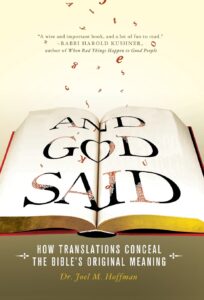And God Said
How Translations Conceal the Bible’s Original Meaning
“Acclaimed translator Dr. Joel M. Hoffman sheds light on the original intention of the Bible’s text and the newly developed means that readers can use to get closer to it. In And God Said his fresh approach has united the topics of religion, language, and linguistics to offer the first modern understanding since the Bible was written.”
A wise and important book, and a lot of fun to read.
— Harold Kushner, author of When Bad Things Happen to Good People
The Bible’s Cutting Room Floor
The Holy Scriptures Missing From Your Bible
“The Bible you usually read is not the complete story. Some holy writings were left out for political or theological reasons, others simply because of the physical restrictions of ancient bookmaking technology. At times, the compilers of the Bible skipped information that they assumed everyone knew. Some passages were left out by accident.
In The Bible’s Cutting Room Floor, acclaimed author and translator Dr. Joel M. Hoffman provides the stories and other texts that didn’t make it into the Bible even though they offer penetrating insight into the Bible and its teachings. The Book of Genesis tells us about Adam and Eve’s time in the Garden of Eden, but not their saga after they get kicked out or the lessons they have for us about good and evil. The Bible introduces us to Abraham, but it doesn’t include the troubling story of his early life, which explains how he came to reject idolatry to become the father of monotheism. And while there are only 150 Psalms in today’s Bible, there used to be many more. Dr. Hoffman deftly brings these and other ancient scriptural texts to life, exploring how they offer new answers to some of the most fundamental and universal questions people ask about their lives. An impressive blend of history, linguistics, and religious scholarship, The Bible’s Cutting Room Floor reveals what’s missing from your Bible, who left it out, and why it is so important.”
An engrossing gift.
— Booklist
The Bible Doesn’t Say That
40 Biblical Mistranslations, Misconceptions, and Other Misunderstandings
“Acclaimed translator Dr. Joel M. Hoffman walks the reader through dozens of mistranslations, misconceptions, and other misunderstandings about the Bible. In forty short, straightforward chapters, he covers morality, life-style, theology, and biblical imagery, including:
- The Bible doesn’t call homosexuality a sin, and it doesn’t advocate for the one-man-one-woman model of the family that has been dubbed “biblical.”
- The Bible’s famous “beat their swords into plowshares” is matched by the militaristic, “beat your plowshares into swords.”
- The often-cited New Testament quotation “God so loved the world” is a mistranslation, as are the titles “Son of Man” and “Son of God.”
- The Ten Commandments don’t prohibit killing or coveting.
What does the Bible say about violence? About the Rapture? About keeping kosher? About marriage and divorce? Hoffman provides answers to all of these and more, succinctly explaining how so many pivotal biblical answers came to be misunderstood.”
Hoffman has produced the best kind of scholarship.
— Publishers Weekly, STARRED review
In the Beginning
A Short History of the Hebrew Language
“Hebrew as a language is just over 3,000 years old and the story of its alphabet is unique among the languages of the world. Hebrew set the stage for almost every modern alphabet, and was the first written language simple enough for everyone, not just scribes, to learn, making it possible to make a written record available to the masses for the first time.
Written language has existed for so many years — since around 3500 BC — that most of us take it for granted. But as Hoffman reveals in this informative work, even the idea that speech can be divided into units called “words” and that these words can be represented with marks on a page had to be discovered. Almost every modern system of writing descends from Hebrew; by studying the history of this language, we can learn a good deal about how we express ourselves today.”
Hoffman has a flair for explaining how languages work.
— Times Literary Supplement




